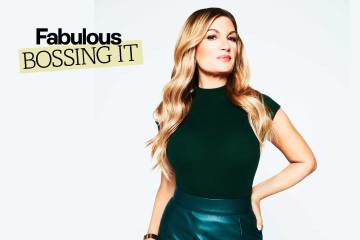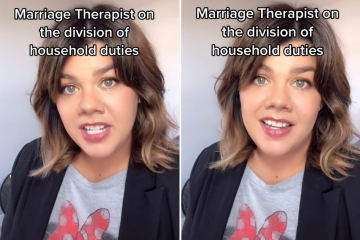
OF course, there are many ways to talk to kids about sex. This is how Anna suggests you go about it.
WINKY is fine but tell them the correct term: I have no issues with using pet names, whether it’s willy, winky or botty. I wouldn’t ask my kids: “Have you washed your anus?” or: “Have you cleaned your penis today?” because it sounds odd.
INSTAGRAM/ANNA WILLIAMSONTV presenter Anna with husband Alex and children Vincenzo, five, and Eleanoria, two[/caption]  GettyAnna Williamson, a mum of two shares her advice on talking to little ones about the birds and the bees[/caption]
GettyAnna Williamson, a mum of two shares her advice on talking to little ones about the birds and the bees[/caption]
Pet names for anatomy are softer and perfectly OK to use but kids must be aware of the correct terminology too. You don’t want them to reach their teens and be ridiculed in a biology lesson for not knowing.
When these nicknames come up in conversation, give them the correct label.
CURIOSITY is natural but keep it at home: Kids are curious and my two-year-old daughter has been known to whack my knees apart while I’m sitting on the loo to see my “nunny”. I gently remind her that private parts are private, whatever we call them, and we don’t show them to anyone else.
Similarly, if your young son blurts out: “Look, Mummy, I’ve got a willy!” it’s about explaining: “Ooh, good for you! But we don’t show that in public because it’s private.”
Read More in Advice

BOSSING IT!
Karren Brady’s career advice on dealing with your boss as a working mother

MARRIAGE HELP
I’m a therapist, moms always make the same complaint about husbands
BE honest(ish) about how babies are made: Forget the stork and the cabbage patch, or that babies come from a magic star.
Keep it literal and simplistic, using language your child will understand.
Most read in Fabulous
ELE-FUN
If you spot the elephant you’re in top 1% – but there’s a helpful trick to find out
OFF MY CHEST
I’ve got big boobs – how I dress for summer to stop people staring at my chest
PRIMANIA
I'm a size 16 & my £13 Primark find is going to be the dress of the summer
WHAT THE FROCK!
I paid £24 for my Shein wedding dress – it's so glam & looked so expensive
CARAVAN QUEEN
Traveller-born Paris Fury shares snap of new caravan garden ornament
FLYING COLOURS
I'm a school receptionist & these are the names of kids who will ace GCSEs
I was once backed into a “Where do babies come from?” corner, and some parents might baulk at how much I shared. I wanted my child to be aware of the mechanics in the most child-appropriate way.
My son understands that Daddy grew a seed in his dingly danglies, and babies came out of Mummy’s nunny. I told him there were times when Mummy and Daddy wanted to show how much they loved each other and the seed was transferred and the baby grew in my tummy.
You know your child better than anyone and it’s fine to say: “That’s the most information I need you to know right now,” and that you will explain more when they are older.
‘Clear up confusion’
DON’T challenge their playground slang: It can be a shock if your child tells you the kids in the playground have been talking about camel toes or a stiffy.
But it’s important as adults that we’re not projecting our skewed associations with certain words on to our kids when they think literally. However, you can clear up confusion. You know your child best and how much detail they can take.
Stick to age-appropriate language and before you launch in, be led by your child.
Find out what their understanding is, of what they have heard and what they think it means. If they’re right, it saves you grappling for an explanation. Then explain how they shouldn’t go around using these slang sex terms.
DON’T leave it too late to have “the sex talk”: I’m pretty liberal but I still cringe when I think about how much I should tell my own kids about sex at such a young age. It’s a fine balance.
I feel the My Body Is Growing book is a fraction too much when it comes to certain uses of words such as ‘squirting’ – but how much of that is me as an adult projecting my own associations around that word?
I didn’t learn about sex until quite late, much to my detriment.
Anna Williamson
I would prefer to use a book like Mummy Laid An Egg which is a little softer in its approach, yet getting the basic and biological facts across.
I didn’t learn about sex until quite late, much to my detriment. At seven, a friend told me you got pregnant on your wedding day. She said you knelt down, touched each other’s privates and then came the baby.
For years, I felt anxious that my parents would see me naked on my wedding day — it was a real fear. This is where you have to weigh up what you tell your child so you don’t create that anxiety.
Sex is the most natural act — as horrendous as it is to picture your parents doing it. It’s important we don’t make sex or pleasure something to feel bad about.
DON’T tell them off for watching porn: Be led by your teenager on this one. Ask them what they have seen or heard and reassure them with phrases such as: “Please don’t feel embarrassed”, and ask what they want to know.
Explain that pornography is only a representation of sex and what people look like — porn is a business, and it’s extreme. In the real world sex is very different and people do it because it feels nice. You could talk about consent and boundaries.
ASK your teens questions about sex: As hard as it might be to hear, you want your teenager to tell you they are having sex — rather than them cracking on while you are oblivious.
‘Start a dialogue’
To get to this point, we as parents have to swallow our natural feelings around the thought of our children having sex. Start a dialogue by asking them questions.
We can’t say: “Yes, you can have sex with that person, who we have pre-approved and it’s going to happen on this day”, because it doesn’t work like that.
If your 16-year-old is sexually active, don’t judge, but listen and guide them as you answer their questions.
On the other hand, if your son is asking: “Everyone is doing stuff, why aren’t I?”, build up their self-esteem.
Read More on The Sun

A TANTASTIC IDEA
I love fake tan and have figured out the perfect way to tan your back

BILL BLOW
Full list of benefits that WON’T get £650 payment to help with cost of living
Empower them by saying they don’t have to do something right now just because their friends are.
- Learn more at Anna’s website therelationshipplace.co.uk.













